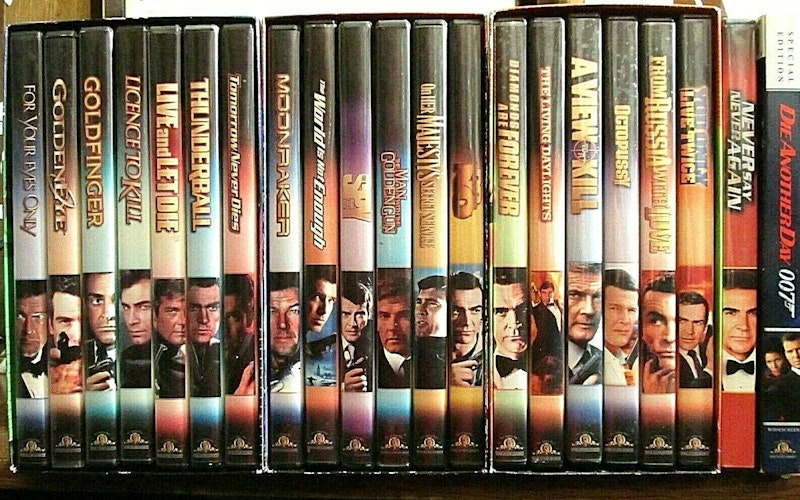Look at the James Bond movies made by Eon Productions since 1962, as I’ve been doing these past months, and you have to wonder: why are they so incredibly successful? It’s not that the Bond films are bad. Some are. Most are at least decent. A few are fine action films. It helped the franchise that the early films are overall strong. But for 60 years, every Bond film has made back multiples of its budget at the box office.
Wikipedia’s put together a list of film franchises by total worldwide grosses; the Bond films are fifth all-time. Adjust for inflation, and Bond’s number two behind the Marvel Cinematic Universe. This is especially notable given that, while the Lord of the Rings movies and J.K. Rowling’s wizard movies are based on British properties, Eon Productions is actually a British company—the Bond films (only co-owned by MGM) are technically foreign films, the only non-American movies on Wikipedia’s list.
There’s a general assumption that American audiences will only watch American stories about American characters. But James Bond is, explicitly, canonically, definitively, not American. That’s the point. He even sometimes fights Americans (individual citizens, not the country as a whole). And Americans flock to watch him. No matter who plays him.
The early- and mid-1960s were near the height of the Cold War, and the idea of a spy in the service of democracy meant something then that it doesn’t now. But if Bond’s 60s success was purely a function of the times, he wouldn’t have lasted. Who now remembers Our Man Flint? Properties like Mission: Impossible and The Man From U.N.C.L.E. and even Get Smart have been reinvented from time to time, but only the Mission: Impossible movies keep getting made—and those have Tom Cruise. The Bond movies keep going no matter who’s in the lead.
At this point it’s tempting to talk about Bond as wish-fulfillment and icon of masculinity: “Bond is what every man would like to be, and what every woman would like to have between her sheets,” said Sunday Times book critic Raymond Mortimer. But it’s not enough of an explanation. There are a lot of power-fantasy characters in film. Why has Bond done so especially well?
You can say that he speaks to hopes and fears about masculinity in general, but 60 years have seen a lot of changes in those hopes and fears, and a lot of changes in Bond. I’m skeptical of the idea that Bond’s somehow been able to change in perfect lock-step with changing societal attitudes to gender for six decades. I’d say that until recently the Bond movies have had women characters with more plot agency than was usual for action films, and so the franchise may have held a particular appeal to women as a result.
But again, that’s less true in this century than it was in the 1960s and 70s. And still the movies keep making money. Perhaps, at this late date, nostalgia plays a part. People remember their first Bond movie from childhood. They may have seen it with their parents. There’s a familiarity to Bond, a set of formulas; each movie tweaks the formulas in different ways, but they’re always recognizable as Bond.
Dr. No came out in 1962; the year Marilyn Monroe died was the year the cinematic James Bond was born. Bond movies have been in constant development or production since before the MPAA introduced its film rating system. If they’re made for another 10 years, likely, they’ll have been around for roughly half of the entire history of cinema, and two-thirds of the history of sound film. They’re an institution, and people have nostalgia for the institutions of their youth even when they grow up and see the flaws.
The short-term future of Bond is unclear; the new Bond has yet to be cast, and there’s no release date for the next film. It won’t be coming this year, and probably not in 2024. What might it be like when it does arrive? Who knows? Bond films have tended both to react against immediately preceding Bond films, and also to follow what other action-adventure films have been doing. After the comparatively grim Daniel Craig films, will Bond borrow a lighter note from the Marvel films and return to the archetype of the suave gadget-wielding secret agent? You could see the logic. But I wonder whether Marvel will have even more influence.
Once the MCU really began making money, there was a brief vogue for cinematic universes. That didn’t last, because it’s hard (and expensive) to build a film universe. But Bond’s well-positioned to make it work.
You can imagine spinoffs about M, Q, the MI6 gang. Miss Moneypenny has had her own bestselling novel line. And then there’s the women Bond’s shared adventures with; Eon almost made spinoffs about Agent XXX from The Spy Who Loved Me, Wai Lin from Tomorrow Never Dies, and Jinx from Die Another Day. None of those came to pass. But with Amazon now owning MGM, and their desire to exploit as much IP as much as possible, we could see a whole James Bond Cinematic Universe in theaters.
If that’s the only change Amazon brings, Bond and Eon will be lucky. But whatever happens, Bond’s likely to keep going, making money into his seventh cinematic decade and beyond. There’s no bigger aspiration for these movies, no real attempt to explore a theme in depth. The Bond films are purely and entirely commercial creations, without the weird visions of Jack Kirby and Steve Ditko buried somewhere in the Marvel DNA, without George Lucas’ nostalgia for science fiction and pulp serials of decades past. They’re designed to make money, and they do their job. Like Bond himself, they’re a blunt instrument. But, on the whole, an entertaining one.

